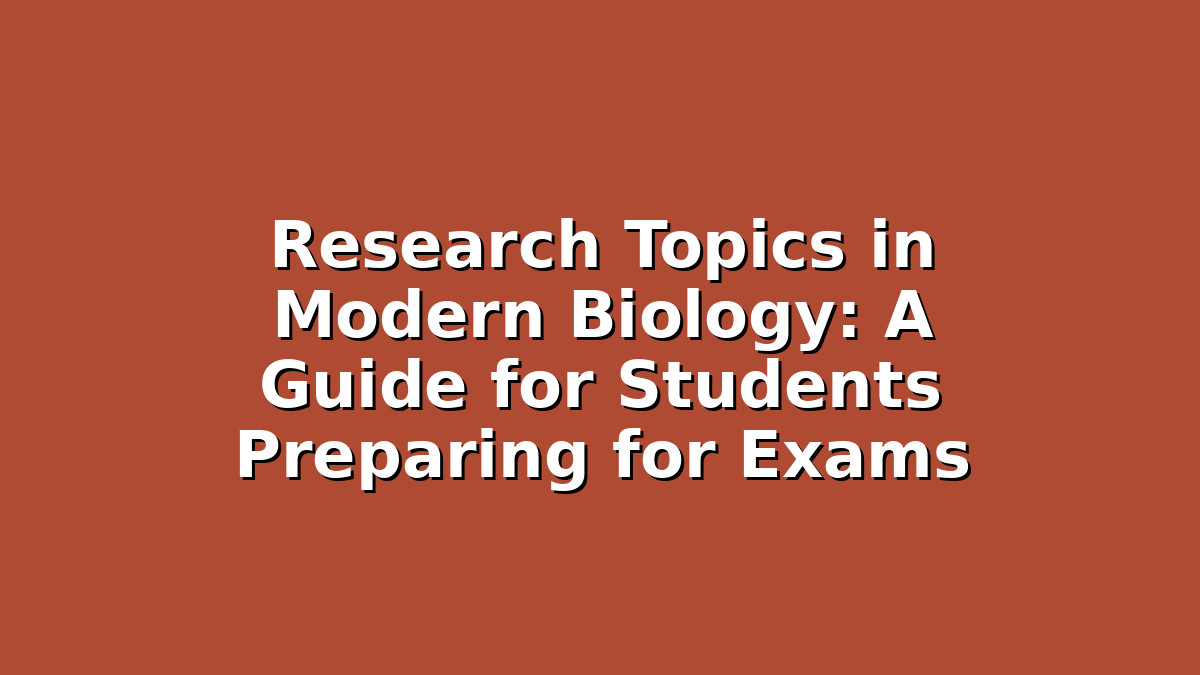Biology is an ever-evolving field that explores the complexities of life, from the tiniest molecules to entire ecosystems. For students preparing for exams or looking to deepen their understanding, focusing on current research topics in modern biology can be both exciting and highly beneficial. Not only do these topics reflect the latest scientific advancements, but they also offer practical insights that can make your study sessions more engaging and relevant. In this article, we’ll explore some of the most important research areas in modern biology and share effective study tips to help you master these subjects with confidence.
Understanding Genetic Engineering and CRISPR Technology
One of the most revolutionary research topics in biology today is genetic engineering, with CRISPR-Cas9 gene editing technology at its forefront. CRISPR allows scientists to precisely modify DNA sequences, opening up possibilities for curing genetic diseases, improving crops, and even combating viruses.
Why This Topic Matters:
Genetic engineering is not just theoretical; it directly impacts medicine, agriculture, and ethics. Grasping this topic can help you appreciate how biology shapes our future.
Study Tips:
– Visual Learning: Use diagrams and animations to understand how CRISPR works at a molecular level. Websites like Khan Academy or YouTube channels such as CrashCourse offer excellent visual explanations.
– Relate Concepts: Connect CRISPR with basic genetics concepts like DNA structure, gene expression, and mutations. This integrated approach will help you retain information better.
– Practice Questions: Find past exam questions or quizzes on genetic engineering to test your understanding. Many online biology forums and educational apps provide relevant practice problems.
– Stay Updated: Since this is a rapidly evolving field, try reading recent articles or news that highlight breakthroughs related to CRISPR. This keeps your knowledge current and may help with essay or discussion questions.
Exploring the Microbiome and Its Impact on Health
The human microbiome—the community of microbes living in and on our bodies—is a hot research topic with widespread implications in health and disease. Scientists are discovering how gut bacteria influence digestion, immunity, mental health, and even behavior.
Why This Topic Matters:
Understanding the microbiome helps you see biology at the interface of environment and human health, a growing focus in medical research and public health.
Study Tips:
– Summarize Key Functions: Make summary notes or flashcards outlining what the microbiome does, how diet and antibiotics affect it, and its links to diseases like obesity or depression.
– Use Case Studies: Look for case studies or research findings that illustrate microbiome impact. Real-world examples help make abstract concepts concrete and memorable.
– Group Discussions: Discuss microbiome topics with classmates or study groups. Explaining ideas aloud deepens comprehension and builds confidence.
– Integrate with Other Topics: Link the microbiome to immunology, nutrition, and human physiology. Understanding these connections will give you a holistic view of biology.
Investigating Climate Change Effects on Biodiversity
Climate change is dramatically reshaping ecosystems and biodiversity worldwide. Modern biology research focuses on how species adapt (or fail to adapt) to changing temperatures, altered habitats, and new competition.
Why This Topic Matters:
This area combines ecology, environmental science, and conservation biology, making it crucial for understanding global challenges and humanity’s role in the natural world.
Study Tips:
– Create Concept Maps: Map out how climate change impacts food chains, habitats, and species survival. Concept maps help organize complex information visually.
– Follow Scientific Reports: Read summaries or simplified versions of IPCC reports or scientific journals focused on climate biology. This exposes you to scientific language and evidence-based reasoning.
– Practice Critical Thinking: Consider the causes and effects of climate change on biodiversity, and think about potential solutions or conservation strategies. This approach prepares you for essay questions and debates.
– Use Multimedia Resources: Documentaries and podcasts about climate change and biodiversity can deepen your interest and understanding, while also providing diverse perspectives.
Conclusion
Studying modern biology research topics like genetic engineering, the human microbiome, and climate change effects on biodiversity not only boosts your exam readiness but also connects you with cutting-edge science that shapes the world. By using effective study techniques such as visual aids, case studies, group discussions, and critical thinking exercises, you can master even the most complex topics with ease. Remember, biology is a dynamic field — staying curious and up-to-date will make your learning journey both enjoyable and rewarding. Keep exploring, stay motivated, and good luck with your exams!

Responses